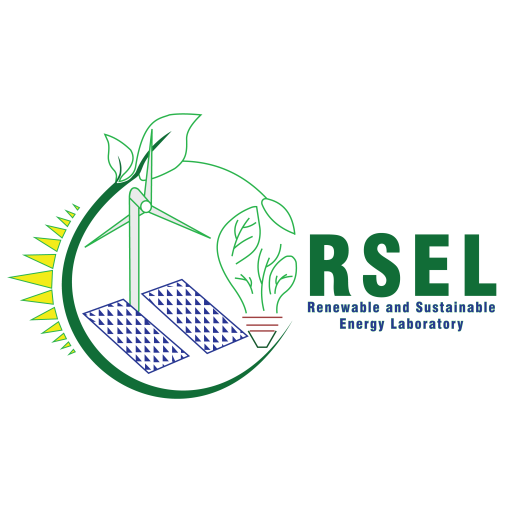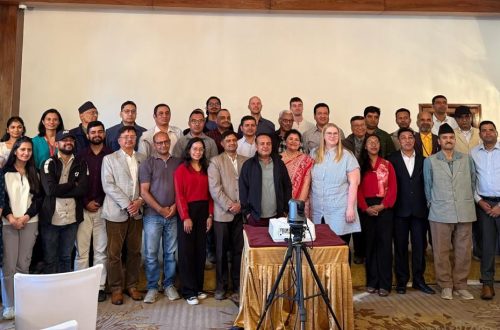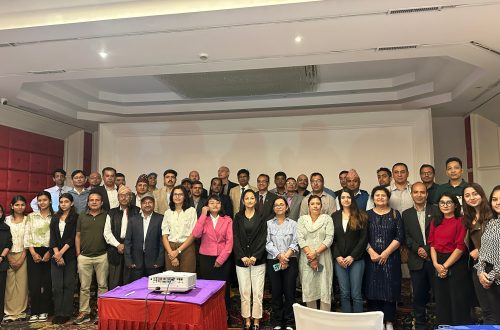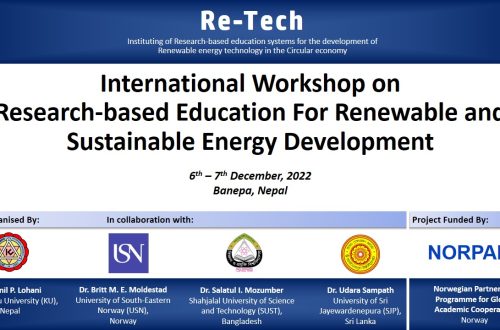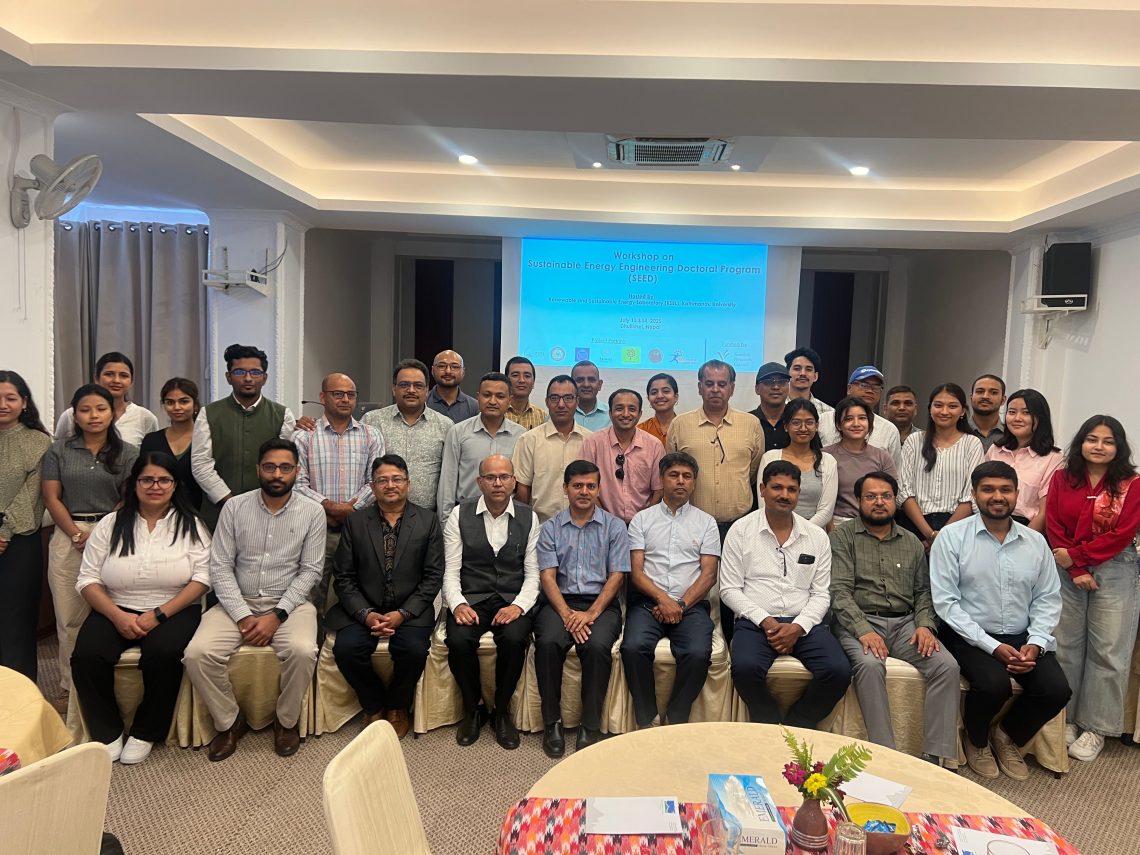
SEED Workshop on Sustainable Energy Engineering
The 𝗥𝗦𝗘𝗟, 𝗞𝗮𝘁𝗵𝗺𝗮𝗻𝗱𝘂 𝗨𝗻𝗶𝘃𝗲𝗿𝘀𝗶𝘁𝘆, successfully hosted a two-day international workshop on the 𝗦𝘂𝘀𝘁𝗮𝗶𝗻𝗮𝗯𝗹𝗲 𝗘𝗻𝗲𝗿𝗴𝘆 𝗘𝗻𝗴𝗶𝗻𝗲𝗲𝗿𝗶𝗻𝗴 𝗗𝗼𝗰𝘁𝗼𝗿𝗮𝗹 𝗣𝗿𝗼𝗴𝗿𝗮𝗺 (𝗦𝗘𝗘𝗗) from 13 to 14 July 2025, in collaboration with 𝗥𝗼𝘆𝗮𝗹 𝗜𝗻𝘀𝘁𝗶𝘁𝘂𝘁𝗲 𝗼𝗳 𝗧𝗲𝗰𝗵𝗻𝗼𝗹𝗼𝗴𝘆 (𝗞𝗧𝗛), 𝗟𝗶𝗻𝗻𝗮𝗲𝘂𝘀 𝗨𝗻𝗶𝘃𝗲𝗿𝘀𝗶𝘁𝘆 (𝗟𝗡𝗨) and 𝗟𝘂𝗻𝗱 𝗨𝗻𝗶𝘃𝗲𝗿𝘀𝗶𝘁𝘆 (𝗟𝗨) in Sweden, 𝗧𝗘𝗥𝗜 𝗦𝗰𝗵𝗼𝗼𝗹 𝗼𝗳 𝗔𝗱𝘃𝗮𝗻𝗰𝗲𝗱 𝗦𝘁𝘂𝗱𝗶𝗲𝘀 (𝗧𝗘𝗥𝗜 𝗦𝗔𝗦), India and 𝗨𝗻𝗶𝘃𝗲𝗿𝘀𝗶𝗱𝗮𝗱 𝗠𝗮𝘆𝗼𝗿 𝗱𝗲 𝗦𝗮𝗻 𝗦𝗶𝗺𝗼́𝗻 (𝗨𝗠𝗦𝗦) in Bolivia funded by 𝗦𝘄𝗲𝗱𝗶𝘀𝗵 𝗥𝗲𝘀𝗲𝗮𝗿𝗰𝗵 𝗖𝗼𝘂𝗻𝗰𝗶𝗹. About 40 participants from Nepal, Sweden, India, and engaged in insightful discussions.
𝗣𝗿𝗼𝗳. 𝗦𝘂𝗻𝗶𝗹 𝗣𝗿𝗮𝘀𝗮𝗱 𝗟𝗼𝗵𝗮𝗻𝗶 (𝗞𝗨) inaugurated the workshop and presented SEED outcomes, highlighting research mobility, specialized PhD courses, successful research collaborations and outcomes, and the strong exchange program that enabled KU scholars to gain valuable experience in Sweden and collaborative networks built through SEED. 𝗣𝗿𝗼𝗳. 𝗕𝗿𝗶𝗷𝗲𝘀𝗵 𝗠𝗮𝗶𝗻𝗮𝗹𝗶 (𝗟𝗡𝗨, 𝗦𝘄𝗲𝗱𝗲𝗻) highlighted the role of education in enabling a just transition, addressing the energy trilemma, climate colonialism, and the importance of systems thinking in curricula. 𝗔𝘀𝘀𝗼𝗰. 𝗣𝗿𝗼𝗳. 𝗗𝗶𝗹𝗶𝗽 𝗞𝗵𝗮𝘁𝗶𝘄𝗮𝗱𝗮 (𝗞𝗧𝗛, 𝗦𝘄𝗲𝗱𝗲𝗻) shared insights on sustainability assessment through lifecycle thinking and systems analysis, tools like CLEWs and OSeMOSYS, and case studies on bioenergy. 𝗣𝗿𝗼𝗳. 𝗡𝗮𝗾𝘂𝗶 𝗔𝗻𝘄𝗲𝗿 (𝗧𝗘𝗥𝗜 𝗦𝗔𝗦, 𝗜𝗻𝗱𝗶𝗮) advocated redesigning engineering curricula to embed sustainability and interdisciplinary skills, while 𝗣𝗿𝗼𝗳. 𝗞𝗿𝘂𝘀𝗵𝗻𝗮 𝗠𝗮𝗵𝗮𝗽𝗮𝘁𝗿𝗮 (𝗟𝗡𝗨, 𝗦𝘄𝗲𝗱𝗲𝗻) discussed urban sustainability and multi-level strategies for energy transitions. 𝗣𝗿𝗼𝗳. 𝗦𝗮𝗻𝗷𝗮𝘆 𝗡𝗮𝘁𝗵 𝗞𝗵𝗮𝗻𝗮𝗹 (𝗠𝗕𝗨𝗦𝗧) highlighted funding opportunities and the integration of development policy into technical education. 𝗠𝗿. 𝗚𝘂𝗻𝗮 𝗥𝗮𝗷 𝗗𝗵𝗮𝗸𝗮𝗹 (𝗥𝗘𝗖𝗢𝗡, 𝗡𝗲𝗽𝗮𝗹) stressed private sector collaboration and innovative financing for sustainable projects, and 𝗠𝗿. 𝗣𝗿𝗮𝗸𝗮𝘀𝗵 𝗦𝗶𝗴𝗱𝗲𝗹 (𝗜𝗻𝘃𝗲𝘀𝘁𝗺𝗲𝗻𝘁 𝗕𝗼𝗮𝗿𝗱 𝗡𝗲𝗽𝗮𝗹) presented investment opportunities and IBN’s role in facilitating clean energy projects. A special highlight was 𝗕𝘂𝗱𝗱𝗵𝗮 𝗦𝗵𝗿𝗲𝘀𝘁𝗵𝗮, who reflected on how his SEED exchange in Sweden enriched his research for Nepal’s energy transition.
The workshop discussions acknowledged that, despite progress in research and education, Nepal still faces brain drain challenges, highlighting the need for better opportunities, policies, and stronger academia-industry ties. Participants agreed that while SEED has fostered research mobility and collaboration, sustaining momentum needs diverse funding, action-driven research tied to national goals, and excellence centres to bridge research with solutions. Continued collaboration among universities, government, and industry was urged for Nepal’s sustainable energy future.


